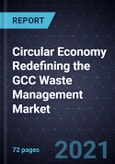Regional Plans to Achieve Self-sufficiency and In-country Local Value Addition Creating Growth Opportunities
Globally, governments and private industries are finding innovative methods to shift to circular economy models for sustainable growth. Circular economy models aim to maximize resource value and eliminate waste by improving the design of materials, products, systems, and businesses. Large organizations that are redevising their business strategies towards circularity can expect greater stability and efficiency among their supply chains. This will have a positive implication for the economy and the environment. The GCC has a high potential for circular economy models as the country is facing the adverse effects of their current waste management practices, which are mostly linear models. By embracing circular economy models, GCC countries can achieve sustainable growth, which is the objective of their federal government.
Municipal waste management is a major concern in the GCC. The total waste generated is expected to increase from 128 Mn MT in 2019 to as high as 164 Mn MT per annum by 2025, across the GCC. The existing landfilling strategies will not be able to handle this increase. This will result in a need for alternative mechanisms to tackle waste.
The critical gap in the present waste management value chain is source segregation. The GCC countries do not follow adequate source segregation but have an efficient collection and transportation system.
The analyst expects the GCC to make an aggressive shift towards integrated waste management, with an emphasis on “waste-to-value” methods like recycling. This can already be seen in the form of recent tenders for waste management in the GCC, as well as in the broader Middle East and North Africa region. This will also cause severe disruptions to the existing waste management industry, which has so far been primarily focused on aspects of collection and transportation. Additionally, there is also a need for greater focus on optimizing the segregation process, both at source and material recovery facilities. Such disruptions will result in the emergence of opportunities in the sector for companies that can deliver solutions around segregation, recycling, treatment, and waste-to-energy solutions across services, technology, and equipment. The opportunities would not be limited to equipment specific to waste, and even energy equipment and pollution control equipment manufacturers stand to gain, with the anticipated increase in demand for boilers, incinerators, flue-gas treatment systems, etc.
Waste management companies must focus on skill development, partnerships, and technology acquisition.
The analyst believes that municipalities in the GCC will play a key role in accelerating optimization through benchmarking, assessing successful models in other regions, and implementing those learnings in the regional context. This is expected to encourage technology and IIOT adoption in the waste management sector. Smart bins, drones, and AI/data analytics are all expected to be deployed in the waste management value chain in the long term to improve recycling and efficiency.
Key Issues Addressed
- What are the circular economy growth opportunities?
- what are the key market trends driving the growth?
- What are the digital trends in waste management?
- Who are the key companies operating in the waste management sector in the GCC?
- What should waste management service providers do to benefit from the identified growth opportunities?








